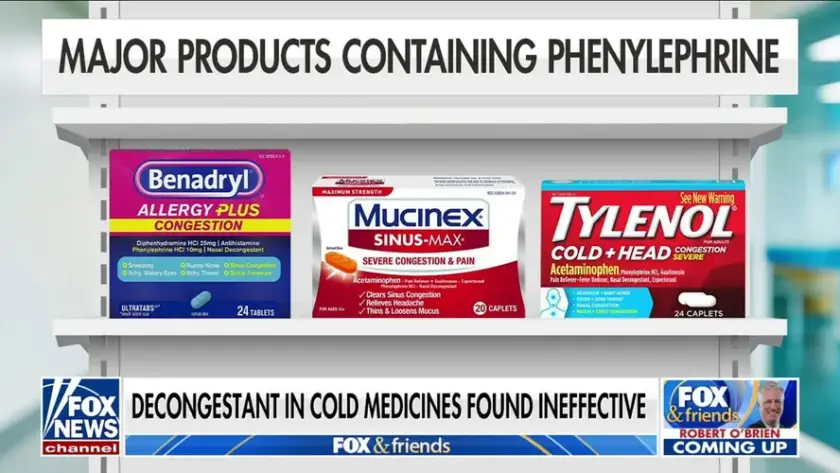Stuffy, congested sinuses are one of the most irritating symptoms of the common cold. And when nasal decongestion medicine won’t work, it can be even more frustration. When our nasal passages swell up, it can make it difficult to breathe or sleep.
Many people reach for over-the-counter decongestants like pseudoephedrine to help relieve stuffy noses and sinus pressure. However, the U.S. Food and Drug Administration (FDA) recently issued a statement indicating that pseudoephedrine and similar medications do not actually reduce swelling or congestion in the nasal passages. This leaves many cold sufferers wondering what options they really have for decongestant relief.
Fortunately, there are several natural alternatives that can help clear up nasal congestion safely and effectively. In this article, we’ll discuss the FDA’s findings on common cold decongestant medications and review 5 natural remedies that have been shown to help relieve stuffed up noses and sinus congestion. We’ll cover herbal supplements like eucalyptus and mint, saline sprays and irrigation techniques, warm compresses, hydration methods, and simple lifestyle adjustments that can make a big difference in easing your cold symptoms and breathing easier. With the FDA casting doubt on standard over-the-counter medications, these evidence-based natural options offer congestion relief you can truly rely on this cold season.
FDA Declares Common Decongestant Doesn’t Work
A main ingredient in many over-the-counter decongestants called phenylephrine does not work, an advisory panel for the FDA announced. The panel agreed further research to test higher doses of the drug would not be beneficial.
Phenylephrine is an ingredient found in Sudafed PE, Vicks Nyquil Sinex Nighttime Sinus Relief and Benadryl Allergy Plus Congestion.
“The FDA report on phenylephrine can be a little confusing,” said Dr. Anjali Bharati, ER physician at Lenox Health Greenwich Village. “To be clear, they are saying that oral phenylephrine is not better than placebo in resolving nasal congestion. They are referring to oral phenylephrine preparations, such as those found in multi-symptom, cough and cold medication.”
“I think if a medication is available over the counter and is recommended for a specific medical condition, it needs to be effective for that medical condition,” Bharati stated. “If it is found that the medication is not effective, and the side effects may do more harm than good, the public needs to be aware, and the medication should be removed from that indication.”
Potential Side Effects Of Phenylephrine
- Increased Blood Pressure – Phenylephrine is a vasoconstrictor, meaning it narrows blood vessels. This can lead to elevated blood pressure, especially in people with hypertension or heart conditions. High doses can severely raise blood pressure.
- Heart Palpitations – The increase in blood pressure can cause abnormalities in heart rhythm, leading to palpitations or racing heart beat.
- Headache and Dizziness – Constricting blood vessels in the brain can lead to rebound headaches and dizziness.
- Nausea and Vomiting – Stomach upset can occur as a side effect of phenylephrine.
- Tremors – Shakiness in the hands or other parts of the body may result from phenylephrine use.
- Anxiety and Restlessness – Phenylephrine is a stimulant that can cause jitters, anxiety, and an inability to relax.
- Insomnia – The stimulant effects can also disrupt sleep and cause insomnia.
- Urinary Retention – Phenylephrine can restrict blood flow to the urinary tract and make urination difficult.
- Allergic Reactions – Some people may experience allergic reactions like rash, itching, or swelling.
- Drug Interactions – Phenylephrine can interact with other medications like antidepressants, blood pressure medications, and thyroid medications.
“Increasing the dosage increases the risk of side effects,” said Dr. Wynne Armand, a physician at Massachusetts General Hospital. “There have been studies that even at a higher dose it still wasn’t effective or better than a placebo.”
In the doses available over the counter, phenylephrine is known to elevate blood pressure, Bharati explained. Since it already does this at a low dose, it may have a more profound effect on blood pressure at higher doses.
“Finding that this medication is ineffective at treating nasal congestion, is an important finding because it can elevate blood pressure in patients without providing them the intended improvement in their nasal congestion,” Bharati stated. “So far, the over-the-counter doses have not raised any safety issues with regards to blood pressure; however, it is known that patients with existing high blood pressure and glaucoma should avoid these medications or use them with caution.”
4 Natural Herbs For Congestion Relief
Oregano
Oregano contains some of the same plant compounds as thyme, including carvacrol and thymol, that give it decongesting power and can help to improve lung function.
Oregano is also a powerful antimicrobial herb and has immune-boosting power that may help your body as it fights off infection. You can use oregano as a tea or in an herbal steam, and you can also take oil of oregano capsules for support while you’re sick.
Pine
You may not think of pine needles as an herb, but they actually have quite a few beneficial properties, including acting as a decongestant! They ease stuffiness and a congested chest, and you can forage them from your own backyard if you have pine trees nearby.
Cypress and fir are two other evergreen needles that can also be used for congestion. They both have expectorant properties and help with coughing, too. Use any variety to make a hot tea or add to an herbal steam. You can also try them in an essential oil blend.
Click Here To Check Out Micro Ingredients Pine Pollen Concentrated Powder To Clear Away Mucous.
Ginger
Ginger is a warm, spicy herb that has several benefits when you’re sick. It helps to boost circulation, which can be great if you feel cold, has immune-boosting properties, and also acts as a decongesting herb.
For a great cold remedy, make some ginger tea by adding this ginger powder to hot water and blend. Then, add lemon juice and raw honey for a throat-soothing, spicy tea that fights congestion.
Click Here To Check Out Micro Ingredients Organic Ginger Powder For Sore Throat.
Cinnamon
Cinnamon is another warming herb that has a long history of use for coughs, colds, congestion, and sore throats. It naturally improves circulation and also has antiviral and antibacterial properties.
Try combining cinnamon and ginger to make a congestion-relieving tea, or add in cardamom, cloves, and other spices to make a warming herbal chai tea.
Click Here To Check Out Micro Ingredients Ceylon Cinnamon For Painful Cough Relief
In Conclusion
The recent FDA advisory panel findings on phenylephrine serve as an important reminder for consumers to be informed about the medications they use for treating cold symptoms. While phenylephrine has been commonly relied upon to relieve nasal congestion, the panel determined it is no more effective than a placebo when taken orally at recommended doses. This means many decongestant products containing phenylephrine likely won’t provide the congestion relief they claim.
Fortunately, there are alternative oral medications, nasal sprays, and natural remedies that offer proven congestion relief without the risks of phenylephrine side effects. Using options like pseudoephedrine, antihistamines, nasal steroids, hydration, steam, and sinus massage can help safely and effectively treat stuffy noses.
As we enter cold season, be sure to check medication labels closely and consult your pharmacist or doctor about effective alternatives if your current decongestant does not seem to work. Seek medical advice before increasing dosages in attempt to improve efficacy. With phenylephrine called into question, being an informed consumer and using proven treatments is key to getting through cold season breathing a little easier.






